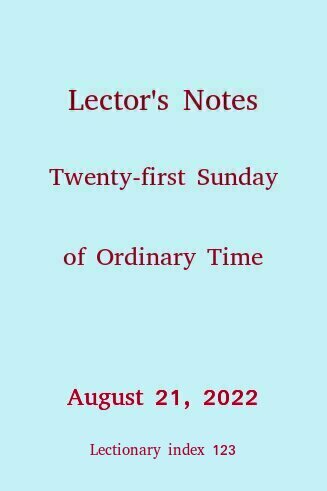

August 24, 2025, Twenty-first Sunday of Ordinary Time
A late prophet surprises his Jewish audience with news that God's favor extends to pagans. Some pagans are even going to get the prestigious positions of priest and Levite.
The Hebrews addressed in our second reading were Jewish converts to Christ. They suffered because they were cut off from the dear religious comforts of their past, and were persecuted. The author interprets these trials as discipline given by a loving parent.
Saint Luke's audience were somewhat sophisticated pagan converts to Christ. They wondered how their new religion developed from the long-exclusive Judaism. Luke recalls some sayings of Jesus that address that question.
Our Liturgical Setting: Today's gospel (Luke 12:49-53) has Jesus continuing his fateful way to Jerusalem. In particular he answers a question that vexed the early church, "How did the favor of God pass from the originally chosen people to the broader, amorphous group of Gentiles, including the evangelist's audience of Christians of pagan origin?" A prophet some 500 years earlier than Jesus had predicted a similar change, and his oracles were appended to the book of the prophet Isaiah. One of those oracles is today's first reading.
The Historical Situation: Almost everything changed for the Lord's chosen people when many of them were taken off into Exile in 587 B.C.E. They returned around 540. The third part of the book of the Prophet Isaiah, chapters 56-66, was written in that situation, returning exiles trying to put everything back together in Jerusalem.
In the prophet's view, one thing that's changing is that the Lord now declares the desire to be the Lord of other people in addition to the Jews. Further, some of the converts are to be missionaries (the "fugitives" of today's reading) to still other pagans. All these people, once aliens in regions with strange names, are to come to Jerusalem by every means of travel, bringing offerings with which to worship the Lord. And even the hereditary posts of priests and Levites can be held by these outsiders.
Your Proclamation: Those are very, very big changes, and when you proclaim this, you should sound like the prophet stating something that amazed him and that he knew would leave his audience dumbfounded. Emphasize every word that refers to the others:
Those difficult pronunciations:
| Tarshish | |
| Put | |
| Lud | |
| Mosoch | |
| Tubal | |
| Javan |
Years ago in this space I argued that confident pronunciation (that sounds prepared, not an improvisation) was as good as informed pronunciation. I've changed my mind, if for no other reason than that you, the lector, should be convinced you're doing every part of this ministry as well as you can.
How Their Historical Situation Differs from Ours: We've seen two Sundays ago and last Sunday how the letter to the Hebrews tries to bolster the faith of a persecuted people by appealing to their tradition. We know that tradition as the Old Testament, but these folks didn't yet see that they were "in" the New Testament. Their tradition was just their tradition. The quoted "exhortation addressed to [them] as children" was Proverbs 3:11-12. And the tradition did not have some of our sophisticated ways of thinking.
For example, we (can) distinguish the good that God does and that God wants, from the evil things that God forbids but permits to us free subjects. We know that God wants our freely given love, so we're never coerced. We know that the truly innocent can suffer (look at Jesus!) at the hands of others, and that our own sins bring deserved grief on ourselves and undeserved pain on others. Nor are we blind to the fact that wicked people often "get away with it," at least in the short run. And we have seen that God providentially brings good out of evil, without actually causing the evil.
The Ancient Author's Theological Assumptions: The author of Hebrews takes a different tack in explaining the suffering of his audience. It's God's discipline, given in love, as we would give discipline to a child whom we want to become mature and responsible. (Maybe we should speak of "giving" discipline instead of the customary "imposing" discipline.)
Your Proclamation: That we might use explanations other than divine discipline to make sense of our suffering does not invalidate, by any means, this passage from the word of God. To proclaim this, do your best to take on the mindset of the author. Think of your audience as struggling, wavering, tempted and persecuted (many are, even if they're putting up a brave front). You are speaking in loco parentis (in the place of a parent) to someone whom you love and whose suffering you can't easily or magically fix. You believe in their power, with God's help, to endure faithfully, but you're realistic about their pains. Tell them what they need to hear, in the honest, loving tone of voice they also need to hear.
A good friend told me he was awestruck by the colors in the Sagrada Familia church in Barcelona, Spain. That prompted me to search the Web and find this photo by the travel photographer Ken Kaminesky, who says of the church:
Sagrada Família, is a massive, privately-funded Roman Catholic church that has been under construction in Barcelona, Catalonia, Spain since 1882 and is not expected to be complete until at least 2026. Considered the master-work of renowned Spanish architect Antoni Gaudí (1852-1926), the project's vast scale and idiosyncratic design have made it one of Barcelona's (and Spain's) top tourist attractions for many years.
This page updated August 22, 2025